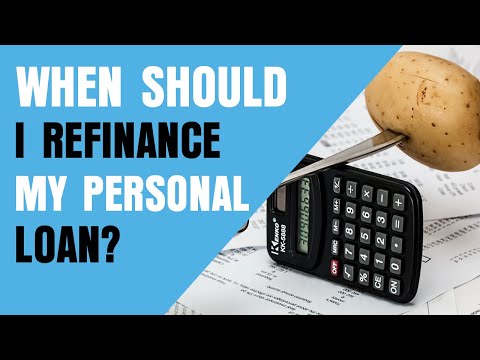In the world of personal finance, loan refinancing can feel like a strategic move to gain control over burgeoning debt. However, as you scratch beneath the surface, you discover that this seemingly straightforward strategy is riddled with complexities. Mortgage Rater is peeling back the layers to reveal five shocking loan refinancing facts that will leave you wide-eyed.

Loan Refinancing: What Does it Mean for Your Wallet?
Refinancing a loan means you are trading in your old loan for a new one with different terms. It’s a common financial move, particularly when interest rates take a nosedive. By refinancing, you might be able to snag that lower rate, which can spell good news for your purse strings.
However, here’s the kicker: the devil is often in the details. The impact of loan refinancing on your wallet varies and can throw you curveballs. It could result in lower monthly payments, a shorter loan term, or even some extra cash through a cash-out refinance. But don’t count your chickens before they hatch, as refinancing may also come with costs that dent those benefits.

1. Refinancing Could Affect Your Tax Deductions
Surprise, surprise – the tax deductions you’ve been enjoying for your mortgage interest could face choppy waters after you refinance. It’s all about the fine print. Here’s the drill:
Joe and Jane Homeowner had their brows furrowed when their tax deductions shrunk after their cash-out refinance. Their tax pro had a tough time breaking it to them that the lavish kitchen remodel they funded through the refinance changed their deduction scripts.
Tax experts weigh in by advising that before you holler “Eureka!” and refinance for a swanky new rate, sit down with a tax professional. This kind of deep dive can illuminate how refinancing may rewrite your tax narratives.
2. How to Refinance Student Loans Successfully and the Startling Benefits
Student loans, a true American saga. If you’re drowning in student debt, here’s a life jacket – refinancing. It’s a real game-changer that could save you a bundle, offering lower interest rates or new repayment terms. But you’ve got to navigate this ship wisely. Here’s how:
Take Emma Graduate, for example. She swapped her multiple loans for a single refined one and boy, did her wallet breathe a sigh of relief! The benefits she scored included a lower rate from a leading lender and a payment period that didn’t outstay its welcome.
The data spells it out too: before refinancing, Emma was paying an average of 6.8% across various loans. Post-refinance, she bagged a solid 4.5%. The dollars and cents speak volumes.
3. Loan Refinancing and Credit Scores: The Unexpected Connection
Here’s a nugget of truth – refinancing your loan tosses your credit score into the ring. Initially, it takes a few hits, but there’s potential for a Rocky-esque comeback.
When you refinance, it triggers a hard inquiry on your credit report, which might shave a few points off your score. However, it’s not doomsday. A study contrasting borrowers who refinanced against those who clung to their old rates shows a pattern: a short-term dip, followed by an eventual uptick as they start saving cash and slashing debt faster.
Jane Credit was skeptical. She saw her score dip by 5 points after refinancing, but within six months, it rebounded, even higher this time, thanks to her reduced debt load. Patience and smart moves pay off – literally.
4. Interest Rate Reductions Aren’t Guaranteed: Unraveling the Variables
Interest rates can be as fickle as the weather, and securing a reduced rate through loan refinancing can feel like trying to catch a leaf on a windy day. Here’s the dope: reduced rates are not a surefire thing.
Take Bob Borrower. He was all set to hit the jackpot with a reduced rate, only to find out the market had other plans. Factors like his credit score and the loan-to-value ratio played hookey with his dreams of lower rates.
The talking heads at top lenders agree – it’s a cocktail of credit history, market trends, employment status, and property values that dictate the rate you get. Bob learned the hard way that timing and a spotless financial record are pivotal in this rate roulette.
5. Refinancing Pitfalls: Hidden Fees Can Outweigh Interest Savings
Now for the cold shower: hidden refinancing costs may just eat up those interest savings you’ve been dreaming about. Fees and closing costs are the silent gatecrashers at your refinancing party.
A close inspection of fine prints from banks like Wells Fargo and JPMorgan Chase lays bare the sobering reality: closing costs can hover around 2-5% of the loan amount. Sometimes it feels like you’re robbing Peter to pay Paul.
Borrowers like Sam Saver have horror stories about refinancing fees nibbling away at their savings. Sam realized too late that the lower interest rate was but a mirage once the closing costs came knocking at his door.

Securing the Best Possible Terms: Gleaning Wisdom From Financial Experts
The gold rush of grabbing the best loan terms can be daunting. Here’s some nuggets of wisdom from the pros:
In 2024, savvy borrowers are leveraging their improved credit scores to strike deals that lenders can’t refuse. They’re playing the long game and locking in rates that are friends to their finances.

| Category | Details |
|---|---|
| Definition | Refinancing is the process of revising and replacing the terms of an existing loan to secure better conditions for the borrower. |
| Key Purpose | To lower interest rates, reduce monthly payments, extend the repayment term, tap into home equity, or change loan types. |
| Types of Refinancing | 1. Rate-and-Term Refinance: Changes the interest rate, loan term, or both without changing the loan amount. 2. Cash-Out Refinance: A new loan for more than the owed amount, providing the difference in cash to the borrower. |
| Credit Implications | Short-term credit score dip upon application and initial inquiry, potential long-term improvement due to better debt management and lower utilization. |
| Typical LTV for Cash-Out Refinance | Up to 80% of the property’s value. |
| Interest Rate Differences | Cash-out refinances usually have higher interest rates or points than rate-and-term refinances due to increased risk for lenders. |
| Borrower Considerations | – Current interest rates vs. original loan rates. – Credit score improvements. – Equity built up in home. – Current financial needs and long-term goals. |
| Lender Motivations | Lenders may refinance to make a profit and to retain customers in their loan servicing portfolio. They might offer competitive rates to existing customers to prevent them from switching to another lender. |
| Refinancing with Original Lender | There may be no waiting period required or it could range from 6 months to 2 years. Refinancing with a new lender can bypass any waiting period. |
| Cost/Benefit | Benefit: Potential for lower overall cost of borrowing, access to cash, better loan terms. Cost: Closing costs, potential prepayment penalties on the original loan, higher rate or points on cash-out refinance. |
Conclusion: Reassessing the Value of Refinancing Your Loans
Now that you’re armed with these loan refinancing facts, it’s time to step back and take stock. Refinancing isn’t for every Joe on the street; it’s a personalized choice that hinges on your unique financial landscape.
Don’t be swayed by pretty numbers or persuasive lenders. Like a master chess player, plan your moves with precision and always stay three steps ahead. Remember to buddy up with financial advisors and tax professionals to decode the complex choreography of refinancing.
So before you take the plunge, let’s lock this mantra in our minds: diligence and wisdom are key. Refinancing your loan is a hefty financial move, and you should tread as carefully as if you were walking on a tightrope. After all, knowledge is more than power; it’s money in the bank.
And hey, while you’re mulling over these loan refinancing truths, why not explore other facets of financial wisdom? Perhaps you might be curious about Meghan Markle ‘s net worth, or looking into painless suicide prevention resources in these trying economic times. If sports strategies are more your style, take a peek at the genius of Kenny Dillingham. Or, for some lighter reading, check out the latest on Teng top fashion trends, or discover something new about Larry Bird ‘s daughter. And for those sweet romantic melodies maybe the tune If I Can Have You resonates with your current mood.

While these topics may seem diverse, they all connect to the essence of modern life – where making informed choices can lead to success, whether you’re Refinancing The house or choosing a new playlist for your evening unwind. Stay knowledgeable, stay savvy, and always look beneath the surface.
Get Ready to Have Your Mind Blown by These Loan Refinancing Facts!
Did Someone Say Rate Drop?
Well, well, well, if it isn’t the ol’ interest rate drop making headlines again! Here’s a jaw-dropper for you: Refinancing your loan could potentially slash your interest rates by a significant margin. Imagine you’re sitting pretty with a 6% interest rate, minding your own business, and suddenly you discover you could refinance( to a rate as cool as the other side of the pillow, let’s say 4%. That’s not just chump change; that’s real money staying snug in your pocket!
From Thirty to Fifteen – Like Magic!
Hold onto your hats because this is where it gets spicy. Some homeowners have waved a magic wand over their 30-year mortgages, turning them into 15-year terms( without pulling a rabbit out of a hat. Not only are they getting out of debt at the speed of light (well, not quite, but you get the picture), but they’re also saving a mountain of cash over the life of the loan. Talk about a financial facelift!
Closing Costs Can Be a Party-Pooper
Just when you thought loan refinancing was all rainbows and butterflies, along comes the party-pooper: closing costs. Yep, sorry to burst your bubble, but refinancing isn’t free.( You’ve got to weigh those upfront fees against your potential savings. But don’t fret; break out that trusty calculator, do a little math, and you’ll know if it’s worth the hoopla.
Your Credit Score Struts Its Stuff
Guess who’s the VIP in the loan refinancing club? Your credit score, the one and only! It struts in, all high and mighty, because this three-digit number can make or break your refinancing dreams. A stellar credit score might get you access to the best refi rates out there,( while a not-so-hot score could leave you wallowing in the ‘better luck next time’ corner.
Did You Say No More Private Mortgage Insurance?
Alright, gather ‘round for the grand finale. If you’ve built up enough equity in your home, say goodbye to that pesky private mortgage insurance (PMI) when you refinance. Shedding PMI is like dropping the extra weight you’ve been carrying around – feels amazing, doesn’t it? When you kiss that PMI goodbye,( it’s like your wallet goes from being on a diet to feasting on the good stuff: extra savings!
Well, there you have it, folks! Five loan refinancing facts that are as shocking as finding money in your old coat pocket. So, before you jump on the bandwagon, make sure you’re strapping in for the right reasons. Will refinancing give your bank account wings, or will it just be another Monday? Only one way to find out – dig deeper and see if refinancing spells fortune or folly for you.

Is it a good idea to refinance a loan?
– It’s like asking if you should order another round at happy hour — it depends on the deal! Refinancing can be a smart move, especially if you snag a lower interest rate, extend the repayment term, or your credit score has scored big and improved. Just remember, the goal is to make your loan less of a wallet-squeezer over time.
Does refinancing a loan hurt your credit?
– Well, sure, it’ll ding your credit score initially – think of it as stubbing your toe. It stings at first, but it’ll heal. Refinancing can trim down your debt or monthly payments, and creditors give a thumbs up for that. Your score might take a few points hit, but it’s usually quick to rally back.
Do you get money when you refinance a loan?
– Ah, cash-out refinance — the financial equivalent of finding forgotten cash in your winter coat! It’s when you say, “Let’s beef up this mortgage and hand me the difference in cash.” Just a heads-up, the price tag for this can be higher interest rates. You’re reshuffling debt to pocket some coin.
Why do banks refinance loans?
– Banks are in it for the greenbacks, and let’s face it, they don’t want you playing for another team. Refinancing your mortgage with them makes their wallets happy and keeps you in their little black book. They’ll dangle those lower rates like a carrot to keep you in the fold.
What is bad for refinancing a loan?
– Here’s the skinny: not having enough equity can throw a wrench in your refinancing plans. You’ll often need to have at least 20% equity to be in the refinance club. Also, if current market rates are giving you the side-eye, higher than your existing ones, it might be a no-go.
What is not a good reason to refinance?
– If you’re just chasing marginal improvements, refinancing might be as pointless as a screen door on a submarine. It’s best for big-league changes like significantly lower interest rates or drastic credit score improvements. Otherwise, the costs might just eat into any minor savings.
At what credit score should I refinance?
– Roll out the red carpet if your credit score is the belle of the ball! Typically, a score of 760 or higher gets you the best refinance rates. Around 620 can get you in the door, but for the royal treatment and serious savings, aim for the high numbers.
Does refinancing mean starting over?
– Nope, refinancing isn’t a reset button; think of it as a renovation. You’re sprucing up your loan’s terms, hopefully making it better for you. You don’t go back to square one; you just adjust the details to fit your current financial floor plan.
How much does it cost refinance?
– Opening your wallet for a refi isn’t always a picnic. It can cost you a pretty penny – typically 2% to 5% of the loan’s principal. We’re talking about appraisal, application fees, and all that jazz, so make sure the savings outweigh the costs.
How much equity do I need to refinance?
– Want to know how much equity you need to shack up with a new loan? Aim for 20% of your home’s value to be your starting point. That’s the sweet spot for most lenders when they consider if you have enough equity bags packed for the refi journey.
Do you lose equity when you refinance?
– Think of refinancing like a financial diet. It might shift things around, but you’re not losing the equity you’ve built up. Your home’s value is the cake, and equity is the icing — and who doesn’t want to keep as much icing as possible?
How soon can you refinance a loan?
– Feeling eager to redo your loan? Some lenders want you to cool your heels for at least six months to two years with conventional loans, but rules vary. Want to jump the gun? Shopping around with other lenders might be your golden ticket.
What is the interest rate today?
– Who doesn’t love a crystal ball for interest rates, right? Since they change quicker than a chameleon on a rainbow, the best bet is to check the latest rates with lenders ASAP to get the real-time lowdown.
Do banks like when you refinance?
– Sure, banks get a kick out of refinancing. It’s like you coming back for an encore — it keeps you in their spotlight and adds to their treasure chest. It’s all about staying in your good books and keeping that moolah coming.
Can a bank refuse to refinance?
– Can a bank give you the red light for a refi? Yep, just like getting turned away at an exclusive club. If they think you’re not up to snuff financially, they might say, “Nah, let’s not dance this dance.”
At what point is it not worth it to refinance?
– Wondering when to put the brakes on refinancing? If the closing costs give your savings a run for their money or rates just give a shoulder shrug of improvement, then it’s probably not your victory lap.
At what point is it worth it to refinance?
– It’s game-on for refinancing when you can lock in a discount on the interest rate or feather your nest with more fitting loan terms. If the numbers say you’ll save a wad of cash, then it’s a slam dunk.
Is now a bad time to refinance?
– As for refinancing right now, it’s a bit of a “how long is a piece of string?” situation. You’ve got to weigh those rates, fees, and your current loan against your financial goals. It’s not exactly the stars aligning; it’s about whether it lines your pockets.
Does refinancing mean you get more money?
– When you opt for a cash-out refi, you’re kind of turning your home into an ATM – you get more cash, but remember, you’re also increasing the mortgage balance. It’s not free money; it’s leveraging your home’s equity to liquidate some funds.




